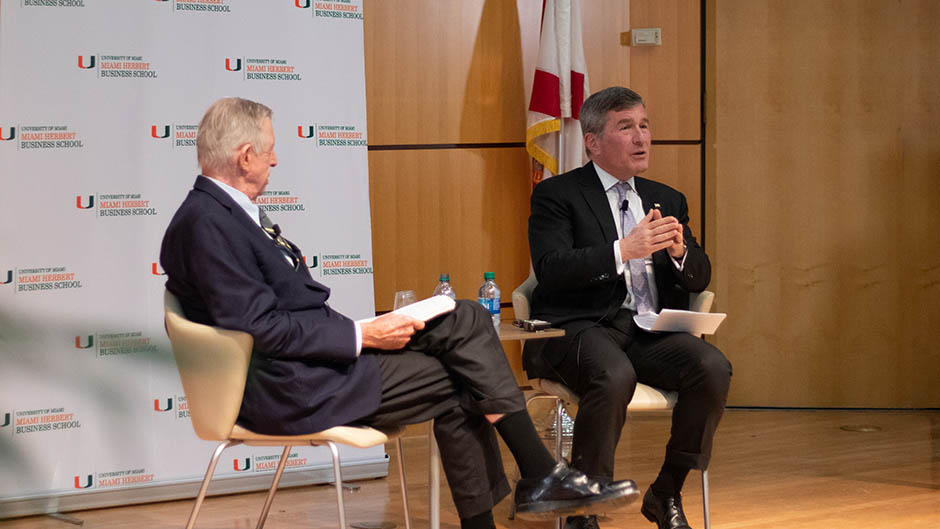Although the conversation traversed many topics, Cobb, a longtime Florida business leader and university trustee for 48 years, invited Rivkin to share his leadership creed, which was the highlight of the dialogue. Reflecting on his distinguished career, Rivkin shared five principles of leadership.
1. Do not isolate yourself.
According to Rivkin, a common problem for CEOs and presidents is getting into a bubble that conscripts them into isolated silos. Such isolation makes it difficult for leaders to make decisions and trust their instincts. During his time in France, Rivkin insisted on getting out on the ground and immersing himself in the environment where he was living and leading. He shared a story that epitomized the argument against isolation and highlighted the importance of having conversations with ordinary people. He would ask people “What do they like about the United States?” Replies ranged, but many said they liked popular American artists such as Will Smith, and Rivkin not only recognized the power of that information but also capitalized on it.
2. Good ideas come from anywhere.
Whether in government or business, Rivkin suggests, a title is just a title. In other words, bad ideas can come from those at the top of the organization (those with higher titles), while good ideas can come from people at the bottom of the hierarchy. One of his colleagues used to bounce ideas off a janitor, and when inquired about his behavior, his colleague said, with a sardonic voice, “Good ideas can come from anywhere.” When it comes to the ideation process, Rivkin advised approaching ideas with curiosity, irrespective of the source’s title. Applying this principle brings the best out of the organization because all ideas matter, he said.
3. Embrace the future.
Rivkin encourages embracing the future because change is constant. He dislikes the phrase "this is how we have always done things." He tells his employees at the Motion Picture Association that he does not care about how things have been done because that is irrelevant. Instead, he is always looking forward, especially in the movie industry, which moves at a fast pace. For example, he changed the name of the MPA—which was a controversial decision—but it was an accurate reflection of reality as Rivkin saw it (it was originally called the Motion Picture Producers and Distributors of America). But, as Cobb noted, change is always met with resistance. And Rivkin suggested that dissent should be rewarded, instead of either ignored or punished. In his career, which traversed many industries, Rivkin champions the principle of change and of always looking forward.
4. Stand behind your people.
Rivkin encourages leaders to support their people and lead by example, emphasizing that actions speak louder than words. Rather than placing blame on employees when things go wrong, good leaders take responsibility and acknowledge their own shortcomings. By doing so, they alleviate pressure on their employees, fostering an environment where they feel motivated and comfortable taking calculated risks. These risks should be rewarded, not punished. Rivkin also emphasizes the importance of trusting the “power in the field.” “You have to trust the people that you have out on the field [on the ground],” he said. They understand the direct impact of policies on the ground. By valuing their insights and standing behind them, Rivkin champions a leadership style that truly supports its people.
5. Learn to think big.
Rivkin had the opportunity of engaging with former President Barack Obama, from whom he learned the invaluable lessons of “thinking big.” When Rivkin met Obama, the former President was unlikely to win since he was low in the polls. Even so, Obama was thinking big, transcending the boundaries and limitations, both real and imagined.
“Why you and why now?” Rivkin asked Obama.
“When I am president,” Obama replied, “the world is going to look at us differently.”
What Rivkin learned from Obama is “big, enormous thinking” changes the world and our place in it.
“Have big ideas, stay with them, and follow your passion.”
Rivkin's career has spanned several industries. When asked about his success, he shared that he sets goals in his mind and actively seeks out and capitalizes on opportunities. For example, Rivkin always wanted to serve as an ambassador, and when the opportunity loomed on his horizon, he capitalized on it.
Rivkin and Cobb’s conversation left audience members inspired to think big.
“Their insights and experiences will no doubt inspire and lighten us as we continue the mission to foster leadership, innovation, and growth here at Miami Herbert,” said Ann M. Olazábal, interim dean of Miami Herbert.
The Cobb Leadership Lecture Series was founded thanks to the generosity and vision of two remarkable individuals: Ambassadors Sue and Chuck Cobb.
Ambassador Chuck Cobb has served as U.S. Ambassador to Iceland under President George H. W. Bush, Undersecretary of the U.S. Department of Commerce under President Ronald Reagan. And he is the former CEO of Arvida Corporation and Disney Development.
Ambassador Sue Cobb served as U.S. Ambassador to Jamaica under President George W. Bush; Secretary of State of Florida and CEO of the Florida Lottery, both under Governor Jeb Bush; and chair of the Federal Reserve Bank, Miami Branch.
On May 9, 1986, to honor her husband's 50th birthday, she gifted a $50,000 endowment to Miami Herbert, which launched the Cobb Leadership Lecture Series.
The series has also hosted influential figures like Condoleezza Rice, Chris Matthews, Admiral Craig S. Faller, Paul Polman, Stephen A. Schwarzman, Paula Kerger, and Indra Nooyi.

